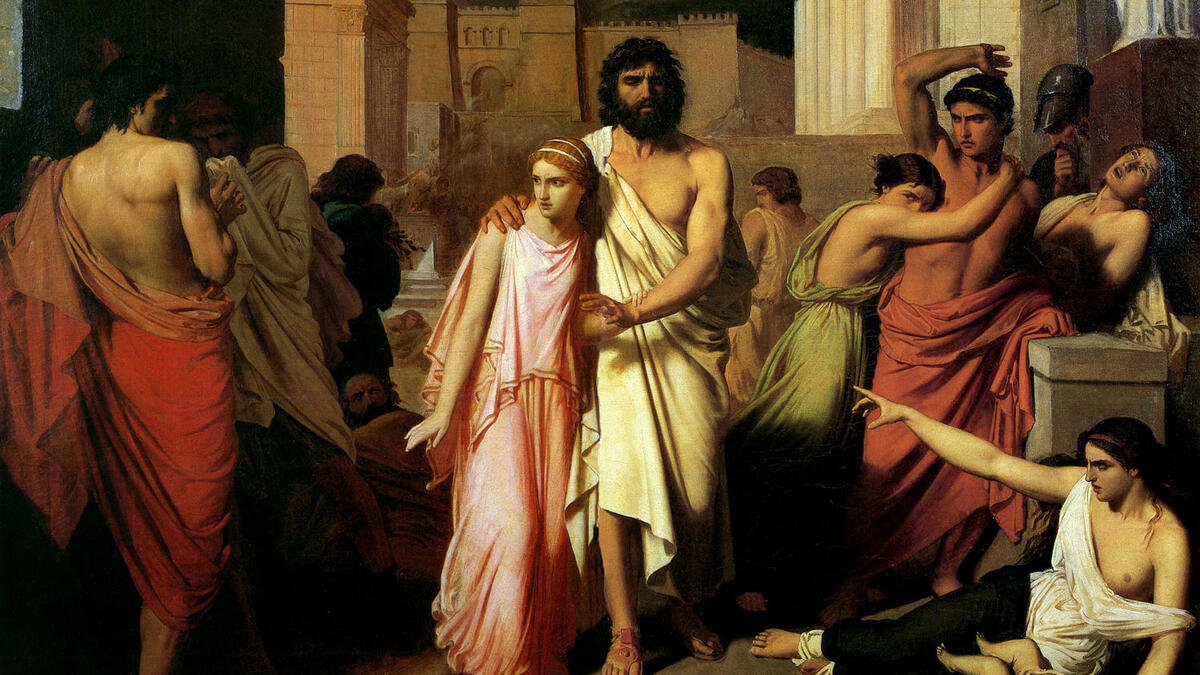In a relatively short time, much has been written about the global cultural response to the COVID-19 pandemic. ASU researchers in the health humanities think there should be even more discussion — connecting it to historical epidemics and continuing for long after the crisis is over — about the cultural aspects of health and health care.
To understand this important and complex approach to health studies, ASU Now spoke to several ASU faculty who have expertise in the area and whose field-specific interests range from 16th-century literature to discourse analysis to theater history.
Our roundtable of experts includes (from left to right below) Cora Fox (early modern literature and culture), Annika Mann (18th-century literature), Matthew Prior (applied linguistics) and Tamara Underiner (theater history and performance studies).
Question: How does your specific field interact with the study of health and culture?
Cora Fox: My research focuses on the history of representations of well-being and fantasies of happy communities mainly in early modern England, where seasons of deadly plague were part of the rhythm of life. I focus particularly on how emotions were represented as supporting or breaking down communities of care in times of stress. Anticipating our global world more fully then he could have realized, John Donne famously wrote in the 17th century: “No man is an island, entire of itself; every man is a piece of the continent, a part of the main ... any man’s death diminishes me, because I am involved in mankind.” Donne was encouraging his Christian readers to take on the afflictions of their neighbors as a way to strengthen their faith and practice, but beyond this theological context, this acknowledgement of our interconnected well-being has been confirmed again and again in modern studies of health and resilience.
Annika Mann: I’ve spent a long time studying contagion during the 18th century, a historical period when contagion was still a fairly flexible concept. That is, during that period the term “contagion” could be used to explain, or raise fears about, the spread of noxious matter, dangerous passions or inflammatory ideas. Because contagion was so flexible, thinking about contagion in medical or literary texts during the 18th century could raise fears about particular persons or populations as well as the various media that could facilitate dangerous spread: air, performances, even printed texts.
Matthew Prior: As an applied linguist and discourse analyst, I’ve long been concerned with the management of emotionality, mental health and well-being through narrative. Narrative constructionist inquiry, an interdisciplinary approach, offers unique insights into human health and well-being. It recognizes the “narrative imperative” as a fundamental part of the human experience. Through the stories we tell ourselves and others of moments and events, people and places, both ordinary and extraordinary, we give meaning to the past, the present and the imagined future. But illness, trauma and other life disruptions can threaten our sense of stability.
Tamara Underiner: “Stand back! This is a job for a theater historian!” The phrase appeared on a T-shirt that made the rounds a few years ago at my professional society’s annual conference, and may hardly seem apt in the middle of a crisis like this one. Yet historians of Western theater can offer a 2,500-year perspective on what happens to humans in times of pandemic.
Question: What can your perspective tell us about the current pandemic?
Fox: As the world confronts the fact that we are indebted to communities of scientists and health care workers to keep us and those we love alive during crises of the body, we are also confronted by the ways we depend on our leaders and institutions — local, national and international — to ensure health as a basic right. I have been asking myself, as many Americans have been, what it means to act in care of my community, and not just myself and my friends and family. Yes, Americans should "stay home," but we should also be considering how the history of this outbreak will be told: Will it be a time when citizens of the U.S. recognized their interconnectedness in a local community and a global world? Or will it be remembered as a moment when their fractured political systems dissolved further into willful ignorance or policies grounded in racism and fear? Narratives of care that develop empathy, altruism and shared endurance must be the focus of cultural responses to this pandemic.
Mann: As a literary historian, it seems to me our moment shares with earlier epidemics and pandemics the way contagion appears to imperil knowledge, particularly knowledge about the self. So we might be asking right now: Am I sick or well? Healthy or infected? How do I know what is in my own body? But, in the face of this uncertainty, other things become suddenly hypervisible. So right now I think we are suddenly very aware of our inextricable connections to one another and to our shared world, connections that flow through objects and actions — particularly patterns of consumption — that we might normally ignore, might categorize as safe.
Prior: Close analysis of our narrative sense-making helps make visible the “whats” and the “hows” of our inner and outer worlds. Labels, e.g., “pandemic,” “foreign virus,” “social isolation,” and metaphors, e.g., “war,” “flattening the curve," for example, are never neutral. They make relevant the tensions between, for example, said/unsaid, self/other and us/them. Narratives thus open up our identities and language choices to reinterpretation, making us vulnerable and forcing us to confront unanticipated emotions and responses.
Underiner: The great exemplar of Greek tragedy, “Oedipus Rex,” opens on a scene of vast devastation we might relate to today: The city of Thebes has been ravaged by a plague that has touched every household, and the drama is propelled by one man’s search for answers to alleviate it — only to learn that he himself is its cause. The heroes and heroines of this and other epic tragedies remind us not only that there are limits to the power we have over our ultimate ends, but that these ends are shaped by a curious collusion between character and circumstance.
Question: When this immediate crisis passes, how can your field contribute to the future of health care and conversations about how to move forward?
Fox: Scholars have revealed the ways a nation’s cultural response — and not just its material response, or lack thereof — leads to crises of caregiving that have life and death consequences. As Priscilla Wald points out in her 2006 book “Contagious: Cultures, Carriers and the Outbreak Narrative,” the word “contagion” means literally ‘‘to touch together.” As early as the 14th century, it referred to ideas as well as bodies and it drew attention to social, emotional and not just physical bonds. It is precisely the tenacity of those social bonds in the U.S. that has been tested in recent years, as political movements have exploited deeply-rooted structural and institutional injustices and violence toward communities of color and indigenous communities to promote both literal and social wall-building. Those walls will need to come down because those affected by this epidemic will need care, and care must be defined as social and communal, not just medical and technological. If we miss this opportunity to address these structural injustices, we will have failed to take the opportunity inherent in the crisis.
Mann: In terms of resources for our own moment, I turn to those scholars and activists who have worked extensively on HIV/AIDS, and who can give insight on what can be done to organize and to advocate for those populations most at risk. Right now I’m reading a lot of Steven W. Thrasher, at Northwestern, who has a recent piece in Slate.
Prior: The present novel coronavirus pandemic has radically affected our lives and our stories by disrupting the social order and disordering our bodies and minds. When many of us are ill, can any of us be well? This forces us to consider how our biographies are entwined with other people and their stories. We are confronted daily with public narratives that describe the ongoing spread of the coronavirus and the efforts of governments and citizens to combat it, and we are encouraged to learn from the personal narratives of victims, survivors and those on the front lines. Yet, narrative is not just a means of representing experience; it is a space for us to confront and to re-story those representations. Applied to the present pandemic, a narrative constructionist approach can help us recognize the creative possibilities for agency and resilience even in the face of uncertainty.
Underiner: Great drama shows us that the choices we make in response to the circumstance of this virus will depend upon our characters — tempered only by the other circumstances in which we are able to exercise them at all. Not all circumstances are created equal, and theater and its allied arts are very good at showing us the parts we play in creating those circumstances, or could play in making them more just and equitable for all. In another vein, theater history also shows that in some times and places, authorities of towns suffering from ague, if not plague, would commission traveling performers as a kind of social remedy: lighthearted forms of theatrical entertainment — farcical sketches, virtuosic acrobatics, other forms of minstrelsy — were understood to have a salutary effect on the public health. Moving forward, I see these insights helping to fortify the foundation for emergent research that helps us better understand exactly how and why the arts and culture contribute to health and well-being, both for individuals and for communities.
More about our panelists
Cora Fox is an associate professor of English and the leader of the health humanities initiative at the Institute for Humanities Research, coordinator of the interdisciplinary health humanities certificate in The College of Liberal Arts and Sciences and a founding board member of Creative Health Collaborations.
Annika Mann is an associate professor of English in the School of Humanities, Arts, and Cultural Studies in the New College of Interdisciplinary Arts and Sciences.
Matthew Prior is an associate professor in the linguistics, applied linguistics and TESOL program of the Department of English, in The College of Liberal Arts and Sciences.
Tamara Underiner is associate dean for academic affairs in the Graduate College, founding director of the doctoral program in theater and performance of the Americas, and founding member and chair of the board for Creative Health Collaborations, Herberger Institute for Design and the Arts.
Suzanne Wilson contributed to this story.
Image at top: Antigone leads Oedipus out of Thebes in the 1842 painting by Charles Francois Jalabert, "Oepidus and Antigone," from Wikimedia Commons.
More Health and medicine
ASU team part of nationwide study looking at Type 2 diabetes in youth
Near the end of an interview in which he talked about the work his team will be doing to tackle the rise in Type 2 diabetes among youth, Arizona State University Professor Gabe Shaibi answered why…
Leading the way in wellness: ASU highlighted in The Princeton Review's 2025 Mental Health Services Honor Roll
Being a college student isn’t easy — navigating new routines, people and places can be a challenge, especially if the right support system is not in place. That's why Arizona State University is a…
New Indigenous health dashboard offers robust database for scholars
By Nicole Greason and Kimberly Linn A team at Arizona State University’s College of Health Solutions and American Indian Studies program has created a new tool to aid researchers…

